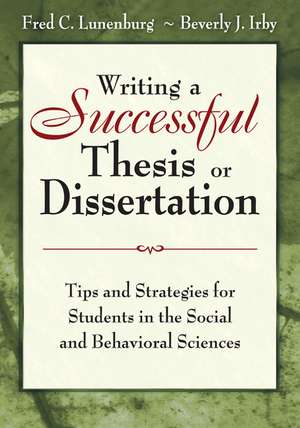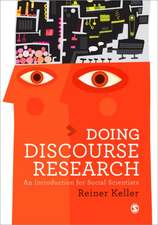Writing a Successful Thesis or Dissertation: Tips and Strategies for Students in the Social and Behavioral Sciences
Autor Fred C. Lunenburg, Beverly J Irbyen Limba Engleză Paperback – 11 feb 2008
- Both quantitative and qualitative research methods
-Using technology effectively
-An overview and tips on the oral defense and presentation
-Tips on adapting the thesis or dissertation for publication
-Suggestions for publishing the research
| Toate formatele și edițiile | Preț | Express |
|---|---|---|
| Paperback (1) | 363.47 lei 3-5 săpt. | +40.13 lei 4-10 zile |
| SAGE Publications – 11 feb 2008 | 363.47 lei 3-5 săpt. | +40.13 lei 4-10 zile |
| Hardback (1) | 600.39 lei 6-8 săpt. | |
| SAGE Publications – 25 feb 2008 | 600.39 lei 6-8 săpt. |
Preț: 363.47 lei
Nou
Puncte Express: 545
Preț estimativ în valută:
69.57€ • 75.60$ • 58.48£
69.57€ • 75.60$ • 58.48£
Carte disponibilă
Livrare economică 31 martie-14 aprilie
Livrare express 14-20 martie pentru 50.12 lei
Preluare comenzi: 021 569.72.76
Specificații
ISBN-13: 9781412942256
ISBN-10: 141294225X
Pagini: 352
Ilustrații: black & white illustrations
Dimensiuni: 178 x 254 x 20 mm
Greutate: 0.79 kg
Ediția:1
Editura: SAGE Publications
Colecția Corwin
Locul publicării:Thousand Oaks, United States
ISBN-10: 141294225X
Pagini: 352
Ilustrații: black & white illustrations
Dimensiuni: 178 x 254 x 20 mm
Greutate: 0.79 kg
Ediția:1
Editura: SAGE Publications
Colecția Corwin
Locul publicării:Thousand Oaks, United States
Recenzii
"Accurate, clearly written, and easy to understand even for the beginning researcher, with equal coverage of both qualitative and quantitative research. This is the only book where the authors combine a textbook approach to teaching research with a how-to approach."
"During 40-plus years of working with doctoral students, this reviewer has encountered a large number of manuscripts written by various professors who give advice to doctoral students in writing their research in dissertation styles. None comes close to comparing to this work done by Lunenburg and Irby, who have developed their book with a plethora of examples of every sort in order to demonstrate to the student many ways of dealing with a host of issues that are encountered in writing a dissertation."
“The best book of its kind I have ever seen. It is succinct yet thorough and includes lots of appropriate examples. It takes the reader from the process of developing a topic through all the stages of writing and defending the dissertation, up to and including presentation and publication. It is academic, pragmatic, and politically astute.”
"This is a very practical book and will be immediately usable for graduate students at any stage during their research. The multitude of examples is wonderful, and the content is very current."
"This book may soon become as dog-eared in my reference library as my APA manual. Some may see a dissertation journey as a thousand miles, but these authors help the writer see the process one step at a time."
"During 40-plus years of working with doctoral students, this reviewer has encountered a large number of manuscripts written by various professors who give advice to doctoral students in writing their research in dissertation styles. None comes close to comparing to this work done by Lunenburg and Irby, who have developed their book with a plethora of examples of every sort in order to demonstrate to the student many ways of dealing with a host of issues that are encountered in writing a dissertation."
“The best book of its kind I have ever seen. It is succinct yet thorough and includes lots of appropriate examples. It takes the reader from the process of developing a topic through all the stages of writing and defending the dissertation, up to and including presentation and publication. It is academic, pragmatic, and politically astute.”
"This is a very practical book and will be immediately usable for graduate students at any stage during their research. The multitude of examples is wonderful, and the content is very current."
"This book may soon become as dog-eared in my reference library as my APA manual. Some may see a dissertation journey as a thousand miles, but these authors help the writer see the process one step at a time."
Cuprins
Preface
About the Authors
Part I. Getting Started
1. Selecting a Suitable Topic
Sources of Topics
Criteria for Topic Selection
Summary
2. Selecting a Chair and Committee
Criteria to Consider in Selecting a Chair
Composition and Role of the Committee
Research Prospective Committee Members
The Desirable Student
Summary
Part II. What You Need to Know
3. Quantitative Research Designs
Descriptive Research
Correlational Research
Causal-Comparative Research
Quasi-Experimental Research
Experimental Research
Theory Development
Summary
4. Basic Statistics
Descriptive Statistics
Inferential Statistics
Summary
5. Qualitative Research Designs
Phenomenological Research
Case Study Research
Ethnographic Research
Grounded Theory Research
Mixed Method Research
Summary
Part III. The Dissertation Chapters
6. Writing the Introduction Chapter
Background of the Study
Statement of the Problem
Purpose of the Study
Significance of the Study
Definition of Terms
Theoretical Framework
Models
Research Questions (or Hypotheses)
Limitations
Delimitations
Assumptions
Organization of the Study
Summary
7. Writing the Literature Review Chapter
Searching the Literature
Writing the Literature Review
Synthesizing the Literature
Summary
8. Writing the Methodology Chapter
Introduction
Selection of Participants
Instrumentation
Data Collection
Data Analysis
Summary
Conclusion
9. Writing the Results Chapter
Introduction
Descriptive Statistics
Testing the Research Questions (Hypotheses)
Additional Analyses
Summary
Conclusion
10. Writing the Discussion Chapter
Summary
Discussion
Implications for Practice
Recommendations for Further Research
Conclusions
Summary
Part IV. The Defense and Afterward
11. The Proposal and Final Defense
Prepare a Well-Written Document
Know the Format
Prepare Your Presentation
Practice Your Presentation
Anticipate Questions
Final Oral Defense
Tips on How to Avoid Common Mistakes
Summary
12. Publishing Your Dissertation
Presentations
Job Interview
Academic Journals
Books
Chapters in Books
Popular Press
Internet Publishing
Desktop Publishing
Planning the Writing Process
Summary
Appendix A: Initial Letter to Participants
Appendix B: First Follow-up Letter to Participants
Appendix C: Second Follow-up Letter to Participants
Appendix D: Dissertation Proposal Outline (Correlational)
Appendix E: Dissertation Proposal Outline (Analysis of Variance)
Appendix F: Dissertation Proposal Outline (Multivariate Analysis of Variance)
Appendix G: Dissertation Proposal Outline (Qualitative)
Appendix H: The Qualitative Research Critique
Appendix I: Agreement: Guidelines for Chairing a Dissertation
Appendix J: Checklist for Dissertation Quality
References
Index
About the Authors
Part I. Getting Started
1. Selecting a Suitable Topic
Sources of Topics
Criteria for Topic Selection
Summary
2. Selecting a Chair and Committee
Criteria to Consider in Selecting a Chair
Composition and Role of the Committee
Research Prospective Committee Members
The Desirable Student
Summary
Part II. What You Need to Know
3. Quantitative Research Designs
Descriptive Research
Correlational Research
Causal-Comparative Research
Quasi-Experimental Research
Experimental Research
Theory Development
Summary
4. Basic Statistics
Descriptive Statistics
Inferential Statistics
Summary
5. Qualitative Research Designs
Phenomenological Research
Case Study Research
Ethnographic Research
Grounded Theory Research
Mixed Method Research
Summary
Part III. The Dissertation Chapters
6. Writing the Introduction Chapter
Background of the Study
Statement of the Problem
Purpose of the Study
Significance of the Study
Definition of Terms
Theoretical Framework
Models
Research Questions (or Hypotheses)
Limitations
Delimitations
Assumptions
Organization of the Study
Summary
7. Writing the Literature Review Chapter
Searching the Literature
Writing the Literature Review
Synthesizing the Literature
Summary
8. Writing the Methodology Chapter
Introduction
Selection of Participants
Instrumentation
Data Collection
Data Analysis
Summary
Conclusion
9. Writing the Results Chapter
Introduction
Descriptive Statistics
Testing the Research Questions (Hypotheses)
Additional Analyses
Summary
Conclusion
10. Writing the Discussion Chapter
Summary
Discussion
Implications for Practice
Recommendations for Further Research
Conclusions
Summary
Part IV. The Defense and Afterward
11. The Proposal and Final Defense
Prepare a Well-Written Document
Know the Format
Prepare Your Presentation
Practice Your Presentation
Anticipate Questions
Final Oral Defense
Tips on How to Avoid Common Mistakes
Summary
12. Publishing Your Dissertation
Presentations
Job Interview
Academic Journals
Books
Chapters in Books
Popular Press
Internet Publishing
Desktop Publishing
Planning the Writing Process
Summary
Appendix A: Initial Letter to Participants
Appendix B: First Follow-up Letter to Participants
Appendix C: Second Follow-up Letter to Participants
Appendix D: Dissertation Proposal Outline (Correlational)
Appendix E: Dissertation Proposal Outline (Analysis of Variance)
Appendix F: Dissertation Proposal Outline (Multivariate Analysis of Variance)
Appendix G: Dissertation Proposal Outline (Qualitative)
Appendix H: The Qualitative Research Critique
Appendix I: Agreement: Guidelines for Chairing a Dissertation
Appendix J: Checklist for Dissertation Quality
References
Index
Notă biografică
Fred C. Lunenburg is Jimmy N. Merchant Professor of Education at Sam Houston State University. Previously, he was on the faculty of educational administration at the University of Louisville, Loyola University Chicago, and Southern Utah University, where he also served as Dean of the College of Education. In addition, he has held public school positions as a high school English teacher and reading specialist, high school assistant principal, high school principal, and superintendent of schools. Dr. Lunenburg¿s scholarship includes 45 books, 15 book chapters, and over 200 articles published in both practitioner and academic/research journals.
Descriere
The advice and resources you need to complete your thesis or dissertation!
Written in a conversational style for both faculty and students, this how-to manual covers quantitative and qualitative research methods and provides comprehensive guidance for successfully completing a master's thesis or doctoral dissertation. Drawing on 40 years of experience supervising dissertations, the authors provide examples from 100 completed projects to guide readers through:
Written in a conversational style for both faculty and students, this how-to manual covers quantitative and qualitative research methods and provides comprehensive guidance for successfully completing a master's thesis or doctoral dissertation. Drawing on 40 years of experience supervising dissertations, the authors provide examples from 100 completed projects to guide readers through:
- Choosing a topic and writing research hypotheses
- Selecting a chair or committee
- Ensuring a successful proposal and oral defense
- Adapting the finished product for publication
- Using the Internet and desktop publishing effectively







